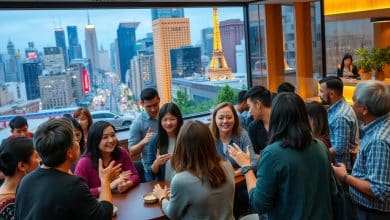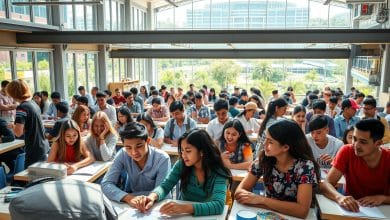How to Prepare for Your First Cultural Exchange Program
Stepping into a new world of opportunities can spark lifelong growth. Cultural exchange programs offer more than travel—they build bridges between communities and shape global perspectives. Participants often return with sharper language skills, deeper empathy, and friendships that span continents.
These adventures challenge individuals to adapt and thrive in unfamiliar environments. Whether studying abroad or volunteering overseas, every experience strengthens problem-solving abilities. Proper planning ensures participants make the most of their time while avoiding common pitfalls.
Global citizenship starts with understanding diverse viewpoints. Exchange initiatives teach collaboration across borders, preparing individuals for today’s interconnected society. They also foster resilience, as navigating cultural differences builds confidence and creativity.
This guide will walk through essential steps to launch a successful journey. From packing tips to communication strategies, preparation transforms uncertainty into excitement. With the right approach, this adventure becomes a milestone in personal and academic development.
Understanding Cultural Exchange Programs
Bridging global divides through shared experiences starts with structured initiatives. These programs connect people across borders to build mutual understanding. They create platforms where participants learn through immersion rather than textbooks.
Defining Exchange Initiatives
Exchange initiatives are designed for reciprocal learning. Participants live abroad, absorbing local customs while sharing their own traditions. This two-way process breaks stereotypes and builds lasting connections between communities.
The Diversity of Program Types
Four main categories cater to different goals:
- Academic: High school exchanges like AFS let students study overseas for a semester or year. University options include credit-earning study abroad programs.
- Work-Based: Au pair placements and working holiday visas mix employment with cultural exposure.
- Volunteer: Programs like Peace Corps involve community development projects abroad.
- Professional: Fulbright Scholarships support advanced research and teaching collaborations.
| Type | Focus | Duration | Example |
|---|---|---|---|
| Academic | Education | 6-12 months | Rotary Youth Exchange |
| Work | Career Growth | 3-24 months | Working Holiday Visa |
| Volunteer | Community Impact | 2 weeks-2 years | NGO Projects |
| Professional | Leadership | Varies | Teacher Exchanges |
Each format helps individuals gain unique skills. Students often choose academic programs, while professionals opt for career-focused opportunities. The right selection depends on personal objectives and desired outcomes.
Overview of Exchange Programs & Their Benefits
International programs unlock transformative learning that reshapes academic paths and career trajectories. Participants return with sharper skills and broader horizons, equipped to thrive in our interconnected world.
Academic and Professional Advantages
Immersive environments accelerate language mastery better than classroom drills. Students encounter teaching styles that challenge traditional learning methods. These experiences often lead to:
- Research collaborations across borders
- Resume-building credentials employers prioritize
- Networks spanning industries and continents
A semester abroad can spark mentorship opportunities with global experts. Professionals gain intercultural communication skills that multinational companies value.
Personal Growth and Global Perspective
Navigating foreign cities builds problem-solving agility. Students develop independence while managing daily tasks in unfamiliar settings. Exposure to diverse viewpoints teaches:
- Critical analysis of personal biases
- Adaptive thinking in dynamic situations
- Empathy through shared human experiences
One returnee noted: “Seeing how communities solve similar problems differently changed how I approach challenges.” This expanded mindset helps graduates contribute meaningfully to global dialogues.
The Importance of Cultural Adaptation
Navigating unfamiliar social landscapes becomes easier when travelers prioritize understanding their host communities. Respect for local ways of life bridges gaps between visitors and residents, creating meaningful connections that last beyond the program duration.
Researching Local Customs and Traditions
Learning a country’s social rules shows respect and prevents misunderstandings. Simple actions—like bowing instead of shaking hands—signal awareness of traditions. For example, in Japan, removing shoes before entering homes remains essential, while in India, eating with the right hand follows customary practice.
Key areas to study before arrival include:
- Appropriate greetings for different age groups
- Dress codes for religious sites or formal events
- Taboo topics in casual conversations
| Aspect | South Korea | Brazil | Egypt |
|---|---|---|---|
| Greetings | Bow with two hands | Cheek kisses common | Handshakes with right hand |
| Dining Etiquette | Wait for eldest to eat first | Arrive 15-30 mins late | Leave food on plate |
| Religious Norms | Remove hats indoors | Avoid political debates | Cover shoulders in mosques |
Attending festivals offers firsthand insight into a destination’s values. One participant shared: “Joining Mexico’s Day of the Dead celebrations taught me more about family bonds than any guidebook.” Such experiences deepen appreciation for diverse lifestyles while building trust within communities.
Academic Readiness for an Exchange Program
Academic success abroad starts with understanding your host school’s unique framework. Students must research course structures and requirements early to avoid last-minute surprises. This preparation ensures credits transfer smoothly and keeps academic goals on track.
Exploring Course Requirements and Structures
Schools like EMLV Graduate School of Management use a 3+2 academic model. Undergraduate students take English courses in years 2-3, while Master’s programs focus on specialized majors. All participants need B2 language certification before arrival.
| Course Level | Language | Key Requirements | Sample Courses |
|---|---|---|---|
| Undergraduate | English | Full-time enrollment | International Business, Digital Marketing |
| Master’s | English/French | Major-specific focus | Corporate Finance, Audit & Performance |
Learning agreements lock in course selections before departure. Mixing classes from different years or majors isn’t allowed. One student advisor notes: “Clear planning prevents credit transfer issues and keeps students focused.”
Schools often use different grading systems than U.S. institutions. Check if classes use exams, group projects, or attendance marks for evaluations. Knowing these details helps students adapt quickly to new academic expectations.
Essential Tips for Preparing Cultural Exchange
Successful international journeys begin with strategic organization. Participants who map out their goals and logistics early often navigate challenges more effectively, turning potential stressors into growth opportunities.
Planning Your Itinerary and Expectations
Balancing academic work with exploration requires smart time management. Allocate specific days for coursework while reserving weekends for local festivals or day trips. One returnee advised: “Leave room for spontaneous adventures—they often become core memories.”
Key considerations include:
- Scheduling buffer days for unexpected delays
- Researching public holidays affecting schedules
- Setting monthly goals for personal growth
Understanding that adaptation takes time prevents frustration. Initial weeks often involve logistical adjustments before settling into routines.
Gathering Visa and Documentation Information
Visa requirements vary significantly across programs. The table below outlines common options for U.S. participants:
| Visa Type | Purpose | Duration |
|---|---|---|
| J-1 | Approved exchange initiatives | 1-24 months |
| F-1 | University-level studies | Program length |
| H-1B | Specialized professional work | Up to 6 years |
Start applications 4-6 months early to account for processing times. Create digital backups of passports, insurance policies, and financial statements. Many countries require proof of funds covering 120% of estimated costs.
Travel insurance should include medical evacuation coverage. Check destination-specific rules—some nations mandate vaccinations or background checks. Staying informed prevents last-minute hurdles that could delay departure.
Learning the Language and Navigating Communication Barriers
Breaking language barriers transforms foreign interactions into meaningful connections. While immersion accelerates skill development, foundational preparation helps students engage confidently from day one. This dual approach turns potential frustrations into stepping stones for growth.
Building Basic Language Skills
Start with high-frequency phrases like greetings, directions, and emergency terms. Apps like Duolingo or Babbel offer structured lessons, while platforms such as iTalki connect learners with native speakers. Daily 15-minute practice sessions yield better results than sporadic cramming.
| Tool | Strength | Practice Style |
|---|---|---|
| Flashcards | Vocabulary retention | Self-paced |
| Language Meetups | Real-time feedback | Group interaction |
| Podcasts | Listening comprehension | Passive learning |
One exchange participant noted: “Labeling household items with sticky notes helped me learn 50 new words weekly.” Such methods create constant exposure even before departure.
Overcoming Communication Challenges
Non-verbal cues often carry hidden meanings. In Japan, prolonged eye contact might seem aggressive, while in Italy, animated gestures enhance storytelling. Translation apps work best for quick clarifications—snap photos of menus or signs for instant decoding.
- Carry a pocket notebook for drawing or writing
- Learn polite phrases to ask for repetition
- Join local clubs to observe conversational rhythms
Mistakes become teachable moments when approached with humor. As one student shared: “My botched dinner order led to cooking lessons with my host family.” Prioritizing understanding over perfection fosters stronger bonds and faster learning.
Financial and Logistical Planning for Your Exchange Experience
Smart money management turns financial worries into opportunities for growth during international studies. Students who plan budgets early avoid stress and focus on their educational goals. Research shows 63% of exchange participants overspend without clear financial guidelines.
Budgeting and Managing Finances
Costs fluctuate wildly between destinations. A semester in Tokyo might triple housing expenses compared to Buenos Aires. Consider these average monthly costs:
| Country | Housing | Meals | Transport |
|---|---|---|---|
| Germany | $450-$800 | $250 | $90 |
| Japan | $700-$1,200 | $400 | $120 |
| Argentina | $300-$500 | $180 | $40 |
Funding options ease the burden. Scholarships from organizations like Gilman cover 40-60% of costs for eligible students. Universities often provide grants for specific programs—check your school’s international office first.
Practical tips from alumni:
- Use multi-currency cards to avoid fees
- Set weekly spending alerts
- Allocate 15% of funds for unexpected costs
“Tracking every dollar forced me to prioritize experiences that mattered most,” shares Maria, a senior who studied in Spain.
Emergency funds prove crucial when flights get canceled or medical needs arise. Schools recommend saving $500-$1,000 beyond estimated expenses. Pair this with travel insurance covering lost luggage and telehealth services.
Embracing Local Culture and Traditions
Active involvement in local traditions creates bonds that transcend language barriers. Students gain profound insights when they step beyond tourist hotspots to engage with authentic community life. This immersion fosters mutual respect and reveals the heartbeat of a destination.
Finding Your Place in Local Celebrations
Festivals and seasonal events offer gateways to understanding regional values. Attend harvest festivals in Italy to learn about family-run vineyards or join Japan’s tea ceremonies to grasp mindfulness practices. Many communities welcome international attendees for:
- Traditional dance workshops
- Seasonal food markets
- Historical reenactments
| Event Type | Cultural Focus | Participation Tips |
|---|---|---|
| Religious Festivals | Spiritual heritage | Dress modestly, ask before photographing rituals |
| Craft Workshops | Artisan skills | Arrive early, bring small gifts for instructors |
| Volunteer Projects | Community needs | Research local NGOs beforehand |
Sharing personal traditions builds reciprocal connections. One student hosted a taco night for their Chilean host family, sparking conversations about Mexican culinary history. Such exchanges often lead to lasting friendships.
Respectful participation requires awareness of etiquette. In Thailand, avoid pointing feet toward sacred objects during temple visits. In Morocco, use your right hand for greetings and meals. Observing these nuances shows appreciation for local norms.
Overcoming Challenges and Adjusting to a New Environment
Navigating life in an unfamiliar setting tests resilience but builds lasting skills. Many students experience culture shock—a natural response to sudden immersion in foreign norms. Recognizing its phases helps turn disorientation into growth opportunities.
Managing Culture Shock
Culture shock typically unfolds in four stages:
| Phase | Duration | Characteristics |
|---|---|---|
| Honeymoon | 1-3 weeks | Excitement, curiosity |
| Frustration | 2-6 weeks | Homesickness, irritability |
| Adjustment | 6-12 weeks | Improved coping skills |
| Acceptance | 3+ months | Comfort in new routines |
One student shared: “Week 4 hit hardest—I missed my family’s Sunday dinners. Joining a cooking club helped me recreate that ritual here.” Practical strategies include:
- Scheduling weekly video calls home without oversharing frustrations
- Journaling to process emotions
- Exploring neighborhoods to find comforting spaces
Finding Support Networks
Strong connections ease adaptation. Universities often provide:
- International student lounges
- Peer mentorship programs
- Counseling services
Local communities offer unexpected allies. Attend language exchange meetups or volunteer at community gardens. As one advisor notes: “Students who join one campus club within 30 days adjust 40% faster.”
“My host mom became my cultural translator—she explained why neighbors avoided direct refusals,” recalls James, who studied in Seoul.
Maximizing Opportunities: Networking and Career Development
Global experiences create ripples that extend far beyond travel. Strategic relationship-building during international programs often leads to unexpected career paths. Alumni frequently credit these connections with opening doors to multinational collaborations and leadership roles.
Building Academic and Professional Connections
Internships through partner universities let students apply classroom knowledge in real-world settings. Many secure job offers by impressing supervisors during placements. Industry-specific LinkedIn groups and alumni networks provide ongoing support long after programs end.
Attending conferences or guest lectures exposes participants to thought leaders. One graduate landed a tech role after discussing AI ethics with a speaker. Others collaborate on research papers with peers met during cultural immersion activities.
Maintaining relationships requires effort. Quarterly check-ins via email or video calls keep connections active. Sharing relevant articles or project updates demonstrates continued engagement.
“My internship mentor recommended me for a position at their firm,” says Carlos, now a marketing manager. These bonds often evolve into mentorships that shape career trajectories across continents.
FAQ
What defines a cultural exchange program?
How do students benefit academically from such programs?
Why is researching local customs important before departure?
What financial steps ensure a smooth experience abroad?
How can participants manage language barriers effectively?
What strategies help overcome homesickness or culture shock?
Which documents are critical for international programs?
How does involvement in community events enrich the journey?
Can exchange programs influence career opportunities?
Published on: 14 de August de 2025







